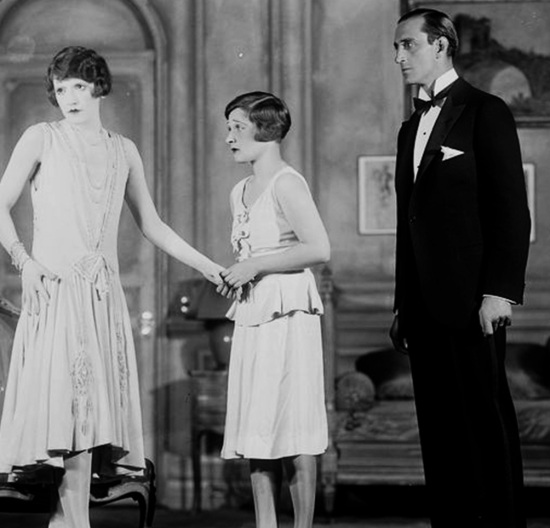The Play
by J. Brooks Atkinson
The New York Times September 30 1926
Expertly written and admirably played, M. Bourdet’ tragedy, “The Captive,” put on at the Empire last evening, may be set down as a genuine achievement in dramatic producing – a long, engrossing, haunting play. Most of the theatrical news from Eruope for several months has hung about this drama, known in Paris as “La Prisonniere.” Vastly popular, sensational in its theme, and recriminations. But whatever emotions the Parisian performance may be conveying, Mr Hornblow’s adaptation, staged perfectly by Mr Miller, emerges as a hard, brittle chronicle, horrible in its implications, terrible to contemplate at times, but sincere and cleanly finished. Seldom has a play been so intelligently cast; nor do we often see a performance so thoroughly disciplined in every detail. For the American version of “La Prisonniere,” does not truckle no smirk. It tells its unpleasant story in a straightforward manner, without evasion or sordid emphasis. And the splendid spirit of the production may protect it from being misunderstood.
Like a practiced dramatist, schooled in the familiar models of playwriting, M. Bourdet casts his play in the “well made” mold familiar to theatre-goers everywhere. Given a theme and the characters to unfold it, he writes a compact drama with a beginning, a climax and a firm conclusion. And writing for the stage, he occasionally tells his story most pungently by use of the symbol of the stage – a bunch of flowers, a closing door offstage, or a trivial command to a servant which conveys prodigious information. As most theatre enthusiasts know by this time, “The Captive” writes the tragedy of a young woman, well-bred and of good family, who falls into a twisted relationship with another woman. For nearly half the play this loathsome possibility, never mentioned, scarcely hinted at, hangs over the drama like a black pall, a prescience of impending doom. A member of the Foreign Office, ordered to Rome, cannot understand why his eldest daughter refuses to accompany him. Thoroughly distraught, she puts him off with an evasion. Her old friend, Jacques Vierieu, she pleads, is in love with her, and may propose to her if properly manoeuvred. When her father departs Irene summons Jacques and tries to persuade him to play the part of fiancé, a part agreeable to him, but not on these false terms. For Irene refuses to confide in him, nor in anyone else, the full truth of her frightful misery.
During the remaining two acts M. Bourdet directs his story expertly at high speed, facing the issue boldly and sounding the note of doom with increasing frequency. Fully conscious of his responsibilities, Jacques marries Irene immediately to save her from herself and to release her from the tyranny of her warped infatuation. For a years spent in travel they get on amicably and return to Paris where they set up their home. But Irene does not escape for long; nor does Jacques. In self-defense he resumes a liaison with his former sweetheart. And just before the final curtain Irene succumbs. The sound of a closing door offstage completes this sombre story.
Relentless in his presentation of this theme, M Bourdet occasionally sets it off against the simple innocence of a little sister or the refreshing normality of Jacques and the charming Francoise Meillant. Without this illuminating relief “The Captive” might degenerate into commercial exploitation of a revolting theme. But again, the brilliant acting in every role redeems it from mere excitation. In the minor roles Miss Trevor and Miss Andrews pour tenderness and softness into the performance. Mr Trevor, as the father, expertly sets the serious tone of the play in the early scenes. But the brunt of the performance falls upon Miss Menken as the wretched girl, Mr Rathbone as Jacques and Mr Wontner as a friend of both. Mr Wontner’s appearance is a brief one, but his function in the drama is highly responsible. His crisp performance last evening was appreciatively applauded. And Mr Rathbone acts with rare dignity and understanding; without a single histrionic flourish, his Jacques Virieu indicates profound emotion and the torture of conflicting emotions.
Well liked though Miss Menken may be, little in her past stage experience had prepared the audience for her stirring performance as the miserable young lady. She communicates the full tragic quality of her part, not only in its relation to the play but also in its relation to life itself. And for the few moments in which this girl believes herself released from an inane captivity, Miss Menken makes the contrast an indescribably tranquil interlude. She was enthusiastically applauded after very act. And once Mr Miller acknowledged the applause with his principle actors. For whatever the theme may be, “The Captive” is to be enjoyed as an expert dramatic production. September 30 1926





I never realized Basil Rathbone had this history in theater or that he was such a pioneer of LGBT rights
LikeLike
This review presents a picture of a play we can’t see, although some of the details are certainly not politically correct for the modern audience. Today, we would not think of the relationship between the women as “twisted,” “revolting,” or “loathsome.” They’re not the words Basil used in his autobiography
LikeLiked by 1 person